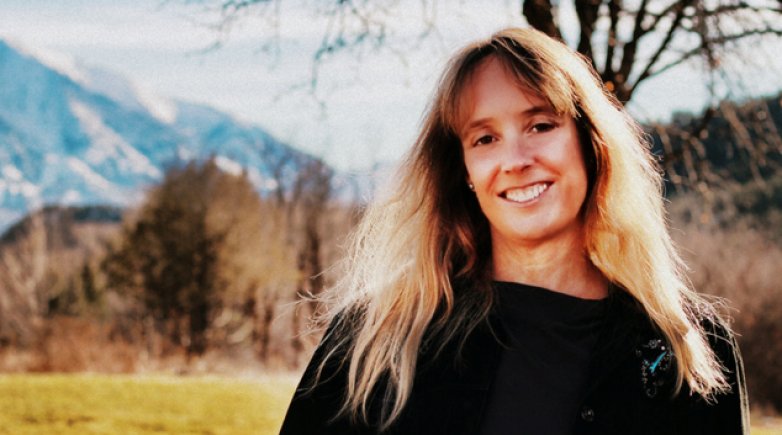Heartshot
A poet, novelist and former Bennett Fellow explores the meanings in a stag’s death.
What does it mean if a heart-shot, bow-shot stag tears on dead legs through the fuel load on your canyon’s north side, exits the woods to die beneath your window at dawn?
If you are a poet and a novelist?
What if you have Frida, antlers springing from her head, stag’s body pierced with arrows, several to the heart, forest mysterious around her, that print of all prints above your desk, the desk you use to write web copy instead of poems?
What if on a shelf in your study there’s a container with the ashes of your firstborn? He died of a heart condition. What has this stag with its blown heart come to say to you? Shot a mile from your house, this animal which could have run in any direction at all?
What if you’ve moved to this house in the wake of divorce? Sometimes you wake sucking air, as if your lungs have stopped. While the stag dies in your yard, dies in its very leap to your yard, you burst from dreams in which lions, wolves stalk your living son. He’s 8. His heart, you’ve already seen, is not getting through the divorce merely “broken.”
When your dogs bark into that dawn, you go looking for what they know. What can you hunt but metaphor? Meanwhile, your alluvial well coughs, sputters, dries, your car battery dies and dies. A tame crow will visit the following year, flying to your shoulder, pacing the backs of your neighbors as they pull food from the earth.
You leave the stag’s body, go of course to your desk. Hunter. Prey. Arrow. Heart. Hart. You look out into the meadow, yellow now in sunfall piercing the canyon cleft. Already no sign where the deer fell. Not a speck of blood, everything hurried away by man, rodent, ant. Aspens feign stillness. Forest mysterious around you. You type on the laptop given to you by the IT department at Leopard, your marketing agency. You patter everything out in a rush. How you waited on the back deck in your oversize T-shirt, thick wool socks. You hadn’t heard a shot, hadn’t imagined a bow. You were still thinking of Frida, the fletching sticking out of the body of the buck. You’d never seen a modern bolt, didn’t know how it would saw through the heart, head off on a further trajectory of its own. T-shirt, socks. You were wondering who to call, how to dispose of the body before Wild Kingdom arrived. Coyotes and lions.
And then you type:
Thirty minutes later the men in camouflage showed up.
That’s when you know you have something.
Where do you get your ideas, the kids at Exeter wanted to know. I didn’t know it was a common question. Exeter, during the Bennett Fellowship, was the first to force me into that real-writer role. A science-fiction author is famous for responding “Poughkeepsie.” That’s not a bad answer; technically, the location of my “idea” would be Lefthand Canyon, outside Boulder.
Lefthand Canyon, as one might guess from the name, is a good place for getting ideas and also for fleshing them out. It’s an edgy, wild place. It’s got megafauna, interesting plant species. Weather and wildfires. Colorful people accrete there or erode into it.
The stag is not an idea, though. He’s an occasion, an invitation. A big-time troublemaker for me. Like John Irving’s dancing bear, maybe. He’s already turned up in a couple of poems; now he’s in a novella that may be part of a novel. Here he is in this essay. I didn’t know the stag would appear in this piece, though. I no longer live in Lefthand; the Frida print has been put away for years. Had I not unwrapped her a day or so before the Bulletin deadline … . In the novella, which I began as a side project during my Bennett year, the protagonist tries to force meanings out of signs and significations. Not only because she is a poet. She was taught to do this. For example, at her boarding school, her history teacher asked her class: Would Russia have modernized without Peter the Great — how important are individuals in history? Another teacher asked whether Falstaff was a tragic or comedic character. She was prodded to discuss Irving’s bear. What is the meaning of this?
I hope my character finds some. Readers are so lucky, especially when we’re around Harkness tables. All the things we get to come up with! As a writer, my hands are in the dirt, there’s a crow kneading my shoulders.
The men in camouflage push through the scrub oak, trod the low-lying juniper. Dew lifts, fir trees dance as if to catch sun in their layered aprons. In a small yellow meadow in Lefthand Canyon, a tiny stucco house stands alone. The deer in the yard is a giant. The woman inside is writing. Soon a fist will strike the door.
Editor's note: This article first appeared in the spring 2018 issue of The Exeter Bulletin.
The George Bennett Fellowship celebrates its 50th anniversary this year. Established by Elias B.M. Kulukundis ’55 in honor of PEA English Instructor George Bennett, the yearlong fellowship provides writers “of outstanding promise” with support they need to pursue their craft. To commemorate the anniversary, we have featured a Bennett Fellow in each Bulletin issue during the 2017-18 academic year. Putnam was the 2011-12 Bennett Fellow.
